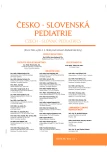-
Medical journals
- Career
Inherited arrhythmic syndromes in children
Authors: T. Tavačová 1; J. Janoušek 1; A. Krebsová 2
Authors‘ workplace: Dětské kardiocentrum 2. lékařské fakulty Univerzity Karlovy a Fakultní nemocnice Motol, Praha 1; Klinika kardiologie, Institut klinické a experimentální medicíny, Praha 2
Published in: Čes-slov Pediat 2020; 75 (1): 27-33.
Category:
Overview
Inherited arrhythmic syndromes, also known as cardiac channelopathies, are group of cardiac electrophysiological disorders characterized by a specific pattern on electrocardiogram and a disease specific risk for malignant ventricular arrhythmias. This group includes long QT syndrome (LQT), short QT syndrome (SQT), catecholaminerg polymorphic ventricular tachycardia (CPVT) and a sodium channelopathies (SCN5A) like Brugada syndrome, progressive cardiac conduction disease (PCCD) etc. Channelopathies manifest mostly in form of syncopes, epileptic seizures or sudden cardiac death. Most types of cardiac channelopathies are inherited in autosomal dominant pattern, autosomal recessive variants are rare and associated with a severe course of the disease. In some cases arrhythmic syndromes overlap arrhythmic cardiomyopathies, which are mainly caused by disorders in desmosomal proteins.
The genetic stratification allows in many cases installation of individualized therapy and presymptomatic treatment of mutation carriers, who are at risk of malignant arrhythmias. The proper clinical diagnosis, genetic analysis and long-term treatment demand multidisciplinary approach and close cooperation among pediatric and adult cardiologists, geneticist, molecular geneticist, psychologists, sport and forensic medicine professionals.
Keywords:
Arrhythmia – child – channelopathies – genetic analysis – ventricular tachycardia – dysritmia
Sources
1. Priori SG, Blomström-Lundqvist C, et al. 2015 European Society of Cardiology Guidelines for the management of patients with ventricular arrhythmias and the prevention of sudden cardiac death summarized by co-chairs. Eur Heart J 2015; 36 (41): 2757–2762.
2. Wilde AAM, Amin A. Channelopathies, genetic testing and risk stratification. Int J Cardiol 2017; 237 : 53–55.
3. Priori SG, Wilde AAM, Horie M, et al. HRS/EHRA/APHRS Expert Consensus Statement on the Diagnosis and Management of Patients with Inherited Primary Arrhythmia Syndromes. Heart Rhythm 2013; 10 (12): 1932–1963.
4. Ahn J, et al. Effectiveness of beta-blockers depending on the genotype of congenital long-QT syndrome: A meta-analysis. PLoS One 2017; 12 (10): 1–13.
5. Priori SG, Blomström-Lundqvist C, et al. 2015 ESC Guidelines for the management of patients with ventricular arrhythmias and the prevention of sudden cardiac death: The Task Force for the Management of Patients with Ventricular Arrhythmias and the Prevention of Sudden Cardiac Death of the European Society of Cardiology (ESC). Eur Heart J 2015; 36 (41): 2793–2867.
6. Mazzanti A, et al. Interplay between genetic substrate, QTc duration, and arrhythmia risk in patients with Long QT Syndrome. J Am Coll Cardiol 2018; 71 (15): 1663–1671.
7. Campuzano O, Sarquella-Brugada G, Cesar S, Arbelo E. Recent advances in short QT Syndrome. Front Cardiovasc Med 2018; 5 : 1–7.
8. Roston TM, et al. The clinical and genetic spectrum of catecholaminergic polymorphic ventricular tachycardia: Findings from an international multicentre registry. Europace 2018; 20 (3): 541–547.
9. Li W, et al. SCN5A Variants : Association with cardiac disorders. Front Physiol 2018; 9 : 1–13.
10. Walsh R, Wilde AAM. SCN5A variants in Brugada syndrome: True, true false, or false true. J Cardiovasc Electrophysiol 2018;30 (1): 128–131.
11. Corrado D, Link MS, Calkins H. Arrhythmogenic right ventricular cardiomyopathy. N Engl J Med 2017; 376 (1): 61–72.
Labels
Neonatology Paediatrics General practitioner for children and adolescents
Article was published inCzech-Slovak Pediatrics

2020 Issue 1-
All articles in this issue
- Editorial: Česko-slovenská Pediatrie v roce 2020
- Editorial: Současné možnosti genetické diagnostiky
- Expanded carrier screening of recessive disorders (CarrierTest) in clinical practice
- Children born after assisted reproduction in the Czech Republic in 2013–2015
- Congenital and hereditary diseases of respiratory tract from genetician’s view
- Genetic causes of sudden infant death syndrome in the era of next generation sequencing.
- Inherited arrhythmic syndromes in children
- It is never too late – HSV1-induced herepetic encephalitis
- Oxytocin and obesity
- Poděkování spolupracovníkům za rok 2019
- Czech-Slovak Pediatrics
- Journal archive
- Current issue
- Online only
- About the journal
Most read in this issue- It is never too late – HSV1-induced herepetic encephalitis
- Inherited arrhythmic syndromes in children
- Genetic causes of sudden infant death syndrome in the era of next generation sequencing.
- Expanded carrier screening of recessive disorders (CarrierTest) in clinical practice
Login#ADS_BOTTOM_SCRIPTS#Forgotten passwordEnter the email address that you registered with. We will send you instructions on how to set a new password.
- Career

